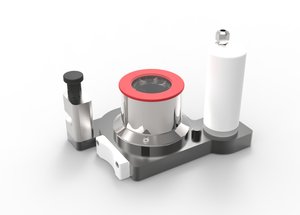Scientific papers
The elastic properties of pharmaceutical powders and compacts play a crucial role in comprehending the intricate phenomena occurring during and after the tableting process. Elastic recovery following compression is known to be associated with adverse occurrences such as capping or delamination of tablets. Traditionally, linear elasticity models the elastic behavior, relying solely on Young's modulus (E), often with a value extrapolated at zero porosity. In this study, four pharmaceutical products were examined, and the elastic behavior of compacts produced under a broad range of applied pressure was characterized. Initially, it was deemed more appropriate to use apparent elastic moduli rather than extrapolations at zero porosity. Subsequently, the findings revealed that there wasn't always a strong correlation between Young's modulus values and the actual elastic recovery of the compacts. Poisson's ratio (v), varying among different products and dependent on porosity, needed consideration. Finally, the bulk modulus (K), which integrates E and v, demonstrated a strong correlation with the elastic recovery of the compacts, establishing it as a relevant parameter for characterizing the elastic behavior of pharmaceutical compacts.
Comments
No comments posted yet.
Add a comment







